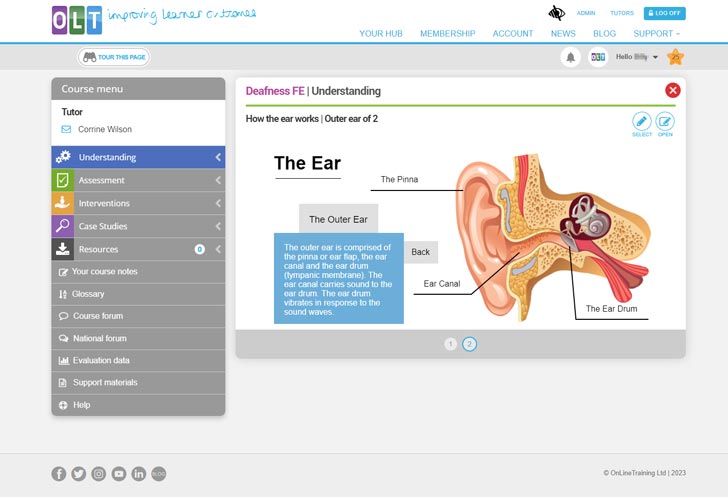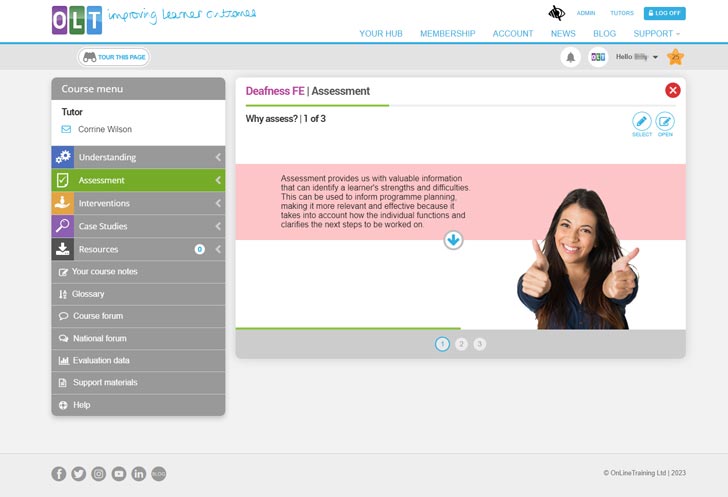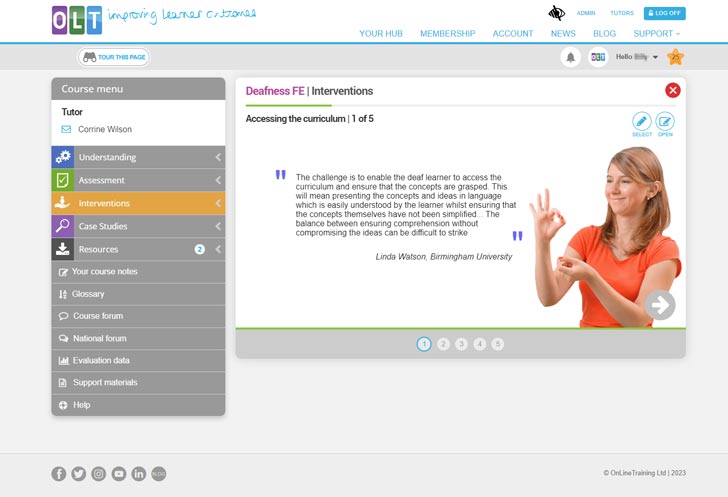
It is estimated that there are more than 50,000 deaf children in the UK (NCDS, 2021) and many will go on to further education. College can be a challenging experience for most students as they adjust to learning independently and being accountable for their own work. However, deaf students are at greater risk of withdrawing from college when the right support and provision are not in place.
Are you a teacher, learning support, college tutor, head of department, or college leader looking to create an inclusive learning environment for a young deaf person?
This 20-hour professional learning course is designed for you. With the help of evidence-based online content and personalised tutored support, you will gain the knowledge, confidence, and skills to assess and plan for learning experiences that encourage independence and narrow the gap in attainment for all deaf students. Parents/carers interested in preparing their children for further education will also find this course useful.
This course responds to the information needs of the whole community centred around supporting the young person with deafness. You will learn how to assess the needs of a learner and go on to develop a support plan consisting of SMART goals and interventions, which you will implement and later review to determine how well it has met the learner’s developmental needs.
Our Deafness (FE) course is perfect for those who work with students in a further education setting such as teachers, college tutors, teaching assistants, heads of department and college leaders. This course is also useful for the parents/carers of students with deafness.
Our courses are structured into four sections. Click on the section headings to reveal page titles and some example content.
Learn how the ear works, how to identify the different types of hearing loss, the role of hearing aids and the importance of inclusion in a further education setting.
- Course aims and objectives
- What do we mean by deafness?
- Quiz: Deafness - Facts and fictions
-
How the ear works

Screenshot from Understanding page 4 - Causes of deafness
- How do we measure hearing loss?
- Communication modes
- Hearing aids
- Cochlear implants
- Impact of deafness
- Inclusion of deaf learners
- Early diagnosis
- Deafness and additional learning needs
- Multi-sensory impairment
- End of section quiz
- Section summary
Explore some of the assessment tools used to monitor the progress and learning outcomes of deaf students.
- Section objectives and your learner profile
-
Why assess?

Screenshot from Assessment page 2 - Early identification and assessment of deafness
- Assessing communication
- Assessing hearing
- Functional assessment in the classroom
- Assessing the classroom environment
- Social inclusion
- Course assignment: Your learner’s three SMART goals
- End of section quiz
- Section summary
Choose from a range of evidence-based teaching strategies to individualise learning and achieve better learning outcomes.
- Section objectives
-
Accessing the curriculum

Screenshot from Interventions page 2 - Supporting communication
- Additional hearing technology
- Different support options in an FE setting
- Support for independence
- Moving on from further education
- Course assignment: Your learner’s interventions
- End of section quiz
- Section summary
View real life examples that illustrate the needs of the individual, the interventions implemented and their resulting progress.
- Case study: Charlotte – Sixth Form
- Case study: Sussex Downs College
- Case study: National Deaf Children’s Society Vloggers
Teaching Assistant
Advisory Teacher
Teaching Assistant
Advisory Teacher
Teaching Assistant
Qualified Teacher
Qualified Teacher
Course learning outcomes
On successful completion of the course, you will be able to:
- understand deafness, its causes and impact on deaf young people
- explain different communication methods, hearing technology and assistive devices
- know what to do if you suspect deafness
- recognise the importance of assessment and how it benefits deaf young people to evaluate their progress, and areas of strength and improvement
- know how to create accessible learning environments using functional assessments to fine-tune and target support
- comprehend the barriers to learning and the benefits of a deaf-friendly approach
- practice using evidence-based teaching strategies to support the development of: communication skills, listening skills, access to the curriculum, social inclusion and learning independence
- contribute towards planning interventions taking account of a young person’s individual development profile and needs
- plan successful transition programmes to higher education or work
- apply a graduated response to meeting the needs of deaf children based on the assess, plan, do, review planning cycle
- create and test a goal and action plan (GAP) for one or more deaf young people in your setting
Ready to get started?
Choose the option that works for you.
Explore our SEND training options - from free courses to whole-school subscriptions.
Sign up now
